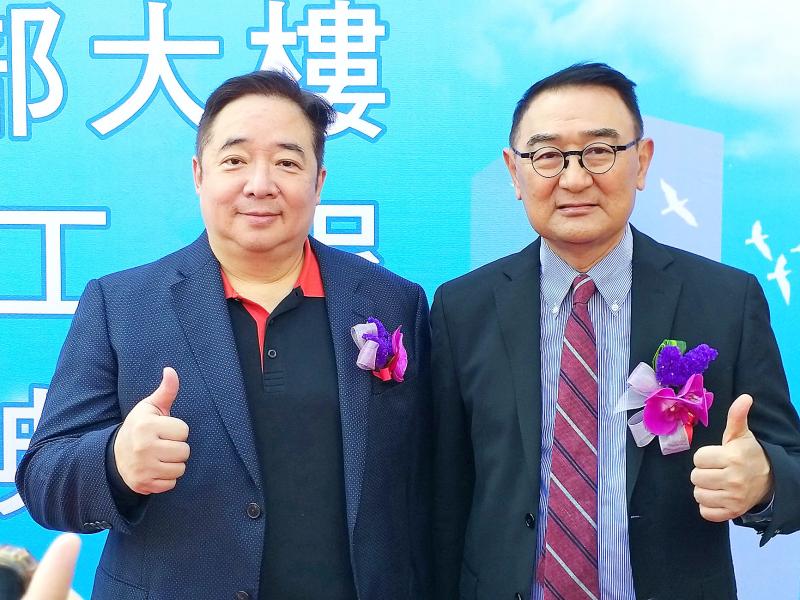MaxLinear Inc, a maker of chips for broadband communications, has agreed to acquire Silicon Motion Technology Corp (慧榮科技) in a cash-and-stock deal valuing the Taiwanese semiconductor firm at US$3.8 billion.
California-based MaxLinear is offering the equivalent of US$114.34 for each of Silicon Motion’s US depositary receipts, the companies said in a statement on Thursday.
The proposal includes US$93.54 in cash and 0.388 MaxLinear shares.

Photo: Liao Hsueh-ju, Taipei Times
The bid represents a 48 percent premium to Silicon Motion’s closing price on April 22, the last trading day before the company was first reported to be exploring a sale. The deal creates a company valued at about US$8 billion including debt, the statement said.
MaxLinear shareholders are to own about 86 percent of the combined company, it said.
Silicon Motion’s US depositary receipts jumped about 30 percent in pre-market trading on Thursday in New York. They were up 17 percent to US$94.83 at 2:24pm in New York trading, giving the company a market value of about US$3.3 billion.
MaxLinear’s shares were down 22 percent to US$41.61, their biggest drop since March 2020. The plunge was part of a larger market decline in which the NASDAQ fell 5 percent.
Silicon Motion makes NAND flash controllers for solid-state storage devices. It also supplies data center drives, and specialized drives for industry and vehicles. The company had also attracted interest from Taiwan-based MediaTek Inc (聯發科), people with knowledge of the matter said.
The acquisition is the largest to date for MaxLinear, Bloomberg data showed.
The deal is expected to close by the first half of next year, subject to regulatory clearance and the approval of Silicon Motion shareholders.
The transaction would generate annual run-rate synergies of about US$100 million within 18 months after closing, and provide an immediate material boost to MaxLinear’s earnings per share and cash flow, the statement said.
Bank of Montreal was the exclusive financial adviser to MaxLinear, while Wells Fargo & Co is providing committed debt financing. Goldman Sachs Group Inc acted as an exclusive financial adviser to Silicon Motion.

It was late morning and steam was rising from water tanks atop the colorful, but opaque-windowed, “soapland” sex parlors in a historic Tokyo red-light district. Walking through the narrow streets, camera in hand, was Beniko — a former sex worker who is trying to capture the spirit of the area once known as Yoshiwara through photography. “People often talk about this neighborhood having a ‘bad history,’” said Beniko, who goes by her nickname. “But the truth is that through the years people have lived here, made a life here, sometimes struggled to survive. I want to share that reality.” In its mid-17th to

‘MAKE OR BREAK’: Nvidia shares remain down more than 9 percent, but investors are hoping CEO Jensen Huang’s speech can stave off fears that the sales boom is peaking Shares in Nvidia Corp’s Taiwanese suppliers mostly closed higher yesterday on hopes that the US artificial intelligence (AI) chip designer would showcase next-generation technologies at its annual AI conference slated to open later in the day. The GPU Technology Conference (GTC) in California is to feature developers, engineers, researchers, inventors and information technology professionals, and would focus on AI, computer graphics, data science, machine learning and autonomous machines. The event comes at a make-or-break moment for the firm, as it heads into the next few quarters, with Nvidia CEO Jensen Huang’s (黃仁勳) keynote speech today seen as having the ability to

NEXT GENERATION: The company also showcased automated machines, including a nursing robot called Nurabot, which is to enter service at a Taichung hospital this year Hon Hai Precision Industry Co (鴻海精密) expects server revenue to exceed its iPhone revenue within two years, with the possibility of achieving this goal as early as this year, chairman Young Liu (劉揚偉) said on Tuesday at Nvidia Corp’s annual technology conference in San Jose, California. AI would be the primary focus this year for the company, also known as Foxconn Technology Group (富士康科技集團), as rapidly advancing AI applications are driving up demand for AI servers, Liu said. The production and shipment of Nvidia’s GB200 chips and the anticipated launch of GB300 chips in the second half of the year would propel

State-run CPC Corp, Taiwan (CPC, 台灣中油) yesterday signed a letter of intent with Alaska Gasline Development Corp (AGDC), expressing an interest to buy liquefied natural gas (LNG) and invest in the latter’s Alaska LNG project, the Ministry of Economic Affairs said in a statement. Under the agreement, CPC is to participate in the project’s upstream gas investment to secure stable energy resources for Taiwan, the ministry said. The Alaska LNG project is jointly promoted by AGDC and major developer Glenfarne Group LLC, as Alaska plans to export up to 20 million tonnes of LNG annually from 2031. It involves constructing an 1,290km